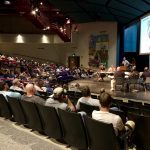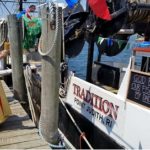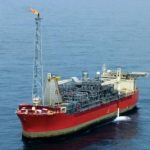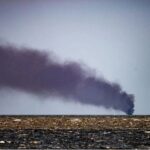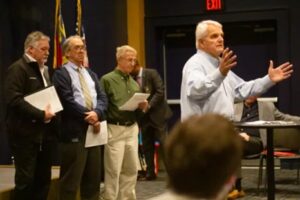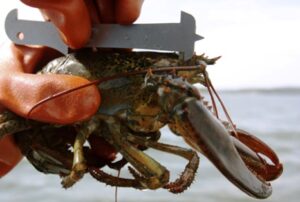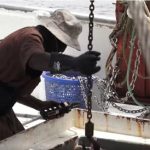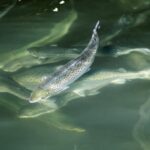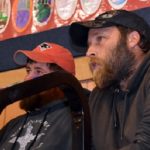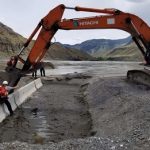Daily Archives: July 10, 2016
Opinion: A lesson unlearned in fisheries
Canadian Fisheries Minister Dominic LeBlanc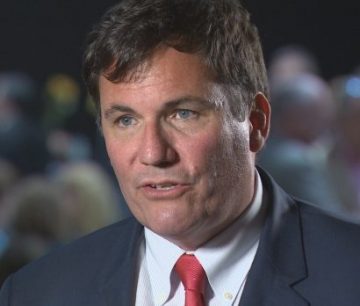 has followed his father’s example by allowing inshore fishermen to continue catching northern shrimp off Newfoundland and Labrador. Under pressure to ban the inshore fleet to protect dwindling stocks, the minister decided instead to trim quotas for all harvesting sectors in the shrimp fishery. Dominic’s father, the late Romeo LeBlanc, served as Canada’s minister of fisheries when Canada proclaimed the 200-mile economic zone in 1977. The elder LeBlanc was determined to manage the industry on behalf of inshore fishermen and small coastal communities adjacent to the resource. To that end, he required fishermen to operate their own vessels, forbade processors from owning vessels and fought the introduction of factory freezer trawlers. In short, father Romeo battled the “corporatization” of the fishery. Son Dominic won’t re-introduce those measures, but his decision on northern shrimp does seem Romeo-esque. On Thursday, he announced the Department of Fisheries and Oceans is abolishing the “last-in, first-out” (LIFO) policy in the northern shrimp fishery. Read the rest here 19:44
has followed his father’s example by allowing inshore fishermen to continue catching northern shrimp off Newfoundland and Labrador. Under pressure to ban the inshore fleet to protect dwindling stocks, the minister decided instead to trim quotas for all harvesting sectors in the shrimp fishery. Dominic’s father, the late Romeo LeBlanc, served as Canada’s minister of fisheries when Canada proclaimed the 200-mile economic zone in 1977. The elder LeBlanc was determined to manage the industry on behalf of inshore fishermen and small coastal communities adjacent to the resource. To that end, he required fishermen to operate their own vessels, forbade processors from owning vessels and fought the introduction of factory freezer trawlers. In short, father Romeo battled the “corporatization” of the fishery. Son Dominic won’t re-introduce those measures, but his decision on northern shrimp does seem Romeo-esque. On Thursday, he announced the Department of Fisheries and Oceans is abolishing the “last-in, first-out” (LIFO) policy in the northern shrimp fishery. Read the rest here 19:44
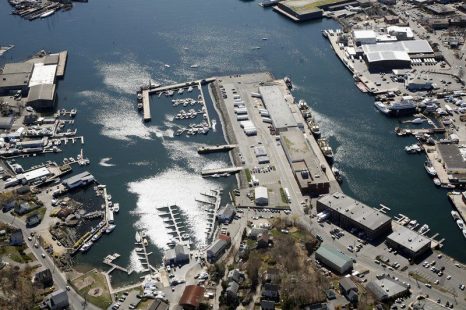
Baker administration to invest $1.1M for Gloucester’s Jodrey State Fish Pier renovations
The Jodrey State Fish Pier is the best performing and most well-run of the state’s four fish piers, emerging as a model for potential changes to Massachusetts’ other three fish piers, according to an evaluation of the state fish pier system by the administration of Gov. Charlie Baker. The evaluation, funded by the Seaport Economic Council and performed by a working group of representatives from a number of state agencies, has resulted in two positives for the 78-year-old fish pier named for Edward R. Jodrey, the Gloucester barber who championed its construction in 1930s: The Baker administration announced last week it will fund $1.1 million in renovations at the pier that covers approximately 8 acres at the head of the harbor, part of what the administration says is its continued “commitment to deepening the economic impact of state maritime facilities.” Those funds will be used to repair the deteriorating roof atop the 40,000-square-foot cold storage and freezing operation that is one of the array of businesses housed in the three buildings on the pier. Read the rest here 17:31
Federal Agencies start work on Columbia River fishing deal
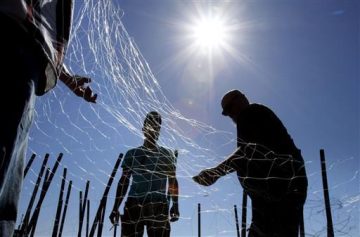 Federal authorities are working on a plan aimed at deciding how much sport, commercial and tribal fishing for salmon and steelhead will be allowed in the Columbia River and its tributaries as part of a long-term agreement starting in 2018. The other main component considered in the environmental review being prepared by the National Marine Fisheries Service and U.S. Fish and Wildlife Service is hatchery production levels. The agencies will use the document as they work to craft an agreement with Idaho, Oregon and Washington, as well as tribes in those states with harvest treaty rights. The length of the agreement has yet to be determined, but a 10-year timeframe is generally supported. Read the story here 16:20
Federal authorities are working on a plan aimed at deciding how much sport, commercial and tribal fishing for salmon and steelhead will be allowed in the Columbia River and its tributaries as part of a long-term agreement starting in 2018. The other main component considered in the environmental review being prepared by the National Marine Fisheries Service and U.S. Fish and Wildlife Service is hatchery production levels. The agencies will use the document as they work to craft an agreement with Idaho, Oregon and Washington, as well as tribes in those states with harvest treaty rights. The length of the agreement has yet to be determined, but a 10-year timeframe is generally supported. Read the story here 16:20
Western Pacific Fishery Management Council takes issue with Hawaii Senator Brian Schatz
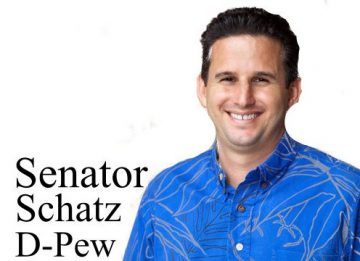 Hawaii Senator Brian Schatz has received a strongly worded letter from the Western Pacific Fishery Management Council concerning his support of the proposed expansion of the Papahanaumokuakea Marine National Monument in the Northwestern Hawaiian islands. A local fishermen who has been following the debate on the proposed expansion says we should be concerned with what’s happening with Hawaii’s fishery because we are next. He says the Hawaii Monument expansion, just like the designation of the Remote Pacific Islands Monument and expansion of the National Marine Sanctuary of American Samoa are examples of the influence of funding by special interest groups such as the Pew Foundation. Read the rest here 13:35
Hawaii Senator Brian Schatz has received a strongly worded letter from the Western Pacific Fishery Management Council concerning his support of the proposed expansion of the Papahanaumokuakea Marine National Monument in the Northwestern Hawaiian islands. A local fishermen who has been following the debate on the proposed expansion says we should be concerned with what’s happening with Hawaii’s fishery because we are next. He says the Hawaii Monument expansion, just like the designation of the Remote Pacific Islands Monument and expansion of the National Marine Sanctuary of American Samoa are examples of the influence of funding by special interest groups such as the Pew Foundation. Read the rest here 13:35
Seminar in Marathon Fla. looks at spiny lobster research
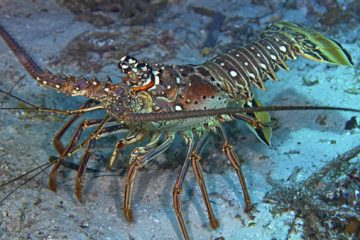 Some top experts on spiny lobster will meet Wednesday in Marathon to discuss the latest research on the crustacean, which is the top-grossing marine species in the Florida Keys generating $70 million a year to the local economy. The Keys waters account for nearly 90 percent of the spiny lobster harvest in the United States. A robust Asian market and a steady catch has made spiny lobster fishery the most lucrative in the Keys. Florida Fish and Wildlife Conservation Commission is hosting the all-day seminar Wednesday as a way to put out the latest research on spiny lobster to the local commercial fishermen and to the public, FWC lobster biologist Tom Matthews said. Bill Kelly, the executive director of the Florida Keys Commercial Fishermen’s Association, said there is a need for new science on the fishery, as the current science used to make regulations is “outdated and goes back to the 1990s.” Read the story here 11:57
Some top experts on spiny lobster will meet Wednesday in Marathon to discuss the latest research on the crustacean, which is the top-grossing marine species in the Florida Keys generating $70 million a year to the local economy. The Keys waters account for nearly 90 percent of the spiny lobster harvest in the United States. A robust Asian market and a steady catch has made spiny lobster fishery the most lucrative in the Keys. Florida Fish and Wildlife Conservation Commission is hosting the all-day seminar Wednesday as a way to put out the latest research on spiny lobster to the local commercial fishermen and to the public, FWC lobster biologist Tom Matthews said. Bill Kelly, the executive director of the Florida Keys Commercial Fishermen’s Association, said there is a need for new science on the fishery, as the current science used to make regulations is “outdated and goes back to the 1990s.” Read the story here 11:57
Connecticut’s Largest Oyster Bed Closed Amid Contamination Concerns
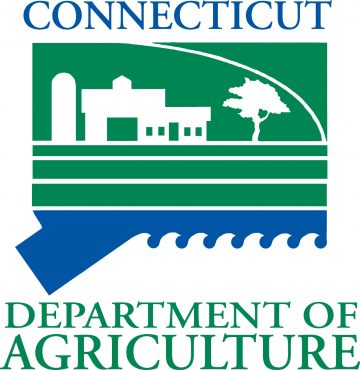 The state’s largest seed-oyster bed has been shut down because of contamination concerns tied to illegal harvesting. The Department of Agriculture says the Housatonic River Natural Oyster Seed Bed was shut down after several incidents involving commercial fisherman breaking harvesting regulations related to contaminated oysters. Commercial fishing firms are supposed to transfer oysters from the river, which contains pollutants from nearby sewage treatment plants, to “relay” beds in the Long Island Sound for six months so they can be naturally cleansed. Oysters that do not go through this process could contain bacteria and viruses that would make people sick if eaten. An oyster boat captain was arrested on June 7 on accusations of illegally transplanting contaminated oysters from the bed onto oysters in the Sound. Since then the state has increased patrols in the area and the Dept. of Agriculture says they have spotted other suspicious activities around the bed. Read the rest here 11:03
The state’s largest seed-oyster bed has been shut down because of contamination concerns tied to illegal harvesting. The Department of Agriculture says the Housatonic River Natural Oyster Seed Bed was shut down after several incidents involving commercial fisherman breaking harvesting regulations related to contaminated oysters. Commercial fishing firms are supposed to transfer oysters from the river, which contains pollutants from nearby sewage treatment plants, to “relay” beds in the Long Island Sound for six months so they can be naturally cleansed. Oysters that do not go through this process could contain bacteria and viruses that would make people sick if eaten. An oyster boat captain was arrested on June 7 on accusations of illegally transplanting contaminated oysters from the bed onto oysters in the Sound. Since then the state has increased patrols in the area and the Dept. of Agriculture says they have spotted other suspicious activities around the bed. Read the rest here 11:03
The Northwestern Hawaiian Islands monument expansion should be opposed – Lyn McNutt
 If you eliminate the U.S. (Hawaiian) fishery, then the area will be completely open to Illegal, Unregulated, Unreported (IUU) fisheries. U.S. fishers are regulated in equipment, species interactions (takes), amount of fish caught and they have VMS onboard as well as observers. The White House supposedly wants to regulate IUU fishing, but this action opens the door for IUU in the area. Who will stop IUU and how will they enforce rules? The state of Hawaii (DLNR) is very quick to claim how they are trying to create a “community” managed system of fisheries ecosystem management with consultation and community involvement in the planning, implementation and operation of community-based fishing. This top-down edict is a complete 180 from “community.” The Antiquities Act does not require any public input. A small group is forcing their view on the people of Hawaii Nei without any discussion of the public (local — not Mainland) perception on the use of the area. This is not pono. Read the op-ed here 10:31
If you eliminate the U.S. (Hawaiian) fishery, then the area will be completely open to Illegal, Unregulated, Unreported (IUU) fisheries. U.S. fishers are regulated in equipment, species interactions (takes), amount of fish caught and they have VMS onboard as well as observers. The White House supposedly wants to regulate IUU fishing, but this action opens the door for IUU in the area. Who will stop IUU and how will they enforce rules? The state of Hawaii (DLNR) is very quick to claim how they are trying to create a “community” managed system of fisheries ecosystem management with consultation and community involvement in the planning, implementation and operation of community-based fishing. This top-down edict is a complete 180 from “community.” The Antiquities Act does not require any public input. A small group is forcing their view on the people of Hawaii Nei without any discussion of the public (local — not Mainland) perception on the use of the area. This is not pono. Read the op-ed here 10:31
Food for Thought! P.E.I. monks buy 600 lbs of lobster to release them into ocean
 More than 600 pounds of lucky lobsters were spared the pot Saturday, thanks to compassionate monks on Prince Edward Island. The monks bought the lobsters from various places around the Island, said Venerable Dan of the Great Enlightenment Buddhist Institute Society in Little Sands. On Saturday, they boarded a fishing boat and released them back into the ocean off the coast of Wood Islands. “Hopefully, we can find a spot where there are no cages waiting for them,” said Dan. The purpose is to cultivate compassion not just for the lobsters, but for all beings, he said. “We respect everyone’s dietary choice, so we’re not doing this to convert everybody to be vegetarians or vegans,” he said. “This whole purpose for us is to cultivate this compassion toward others. It doesn’t have to be lobsters, it can be worms, flies, any animals, drive slower so we don’t run over little critters on the street.” Read the rest here 10:02
More than 600 pounds of lucky lobsters were spared the pot Saturday, thanks to compassionate monks on Prince Edward Island. The monks bought the lobsters from various places around the Island, said Venerable Dan of the Great Enlightenment Buddhist Institute Society in Little Sands. On Saturday, they boarded a fishing boat and released them back into the ocean off the coast of Wood Islands. “Hopefully, we can find a spot where there are no cages waiting for them,” said Dan. The purpose is to cultivate compassion not just for the lobsters, but for all beings, he said. “We respect everyone’s dietary choice, so we’re not doing this to convert everybody to be vegetarians or vegans,” he said. “This whole purpose for us is to cultivate this compassion toward others. It doesn’t have to be lobsters, it can be worms, flies, any animals, drive slower so we don’t run over little critters on the street.” Read the rest here 10:02
Kuskokwim area may see a commercial fishing opening after all
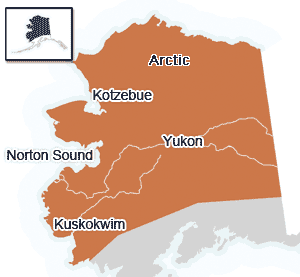 Washington state fish brokers are traveling to the Southwestern Alaska village of Quinhagak Monday in the hope of quickly setting up a commercial operation for the region’s wild salmon this year. An Alaska Dispatch News story earlier this month reported that for the first time since Alaska became a state, no commercial fishing was planned for the Kuskokwim area in 2016 because of the lack of buyers. Jason Lake, one of three partners in the Northwest Seafood Exchange — a fish buyer and broker — said he had markets for the fish and wanted to help the local fishermen. Aaron Poetter, state Fish and Game commercial fisheries manager for the Kuskokwim area, said if a company gets state approval to operate as a fish buyer, he will schedule commercial fishing openings. Read the story here 08:43
Washington state fish brokers are traveling to the Southwestern Alaska village of Quinhagak Monday in the hope of quickly setting up a commercial operation for the region’s wild salmon this year. An Alaska Dispatch News story earlier this month reported that for the first time since Alaska became a state, no commercial fishing was planned for the Kuskokwim area in 2016 because of the lack of buyers. Jason Lake, one of three partners in the Northwest Seafood Exchange — a fish buyer and broker — said he had markets for the fish and wanted to help the local fishermen. Aaron Poetter, state Fish and Game commercial fisheries manager for the Kuskokwim area, said if a company gets state approval to operate as a fish buyer, he will schedule commercial fishing openings. Read the story here 08:43


































